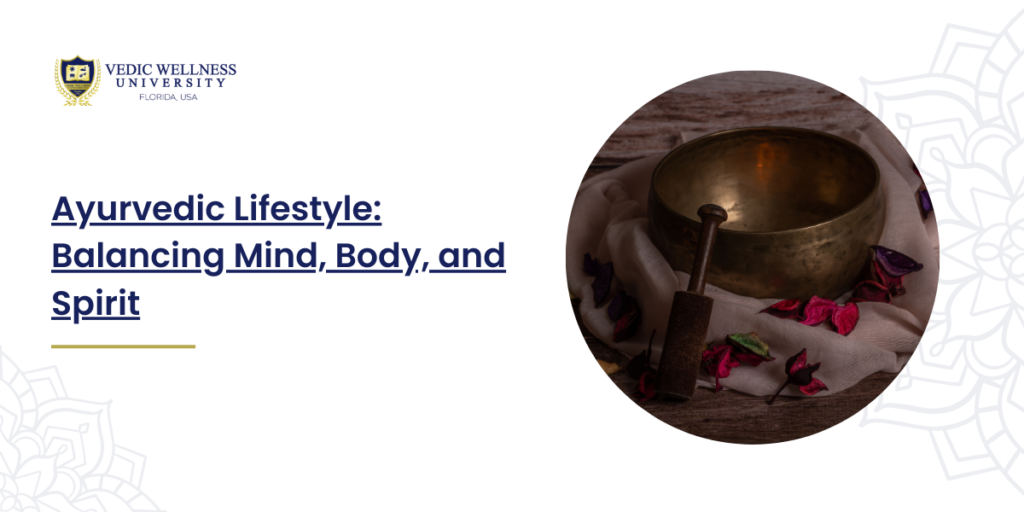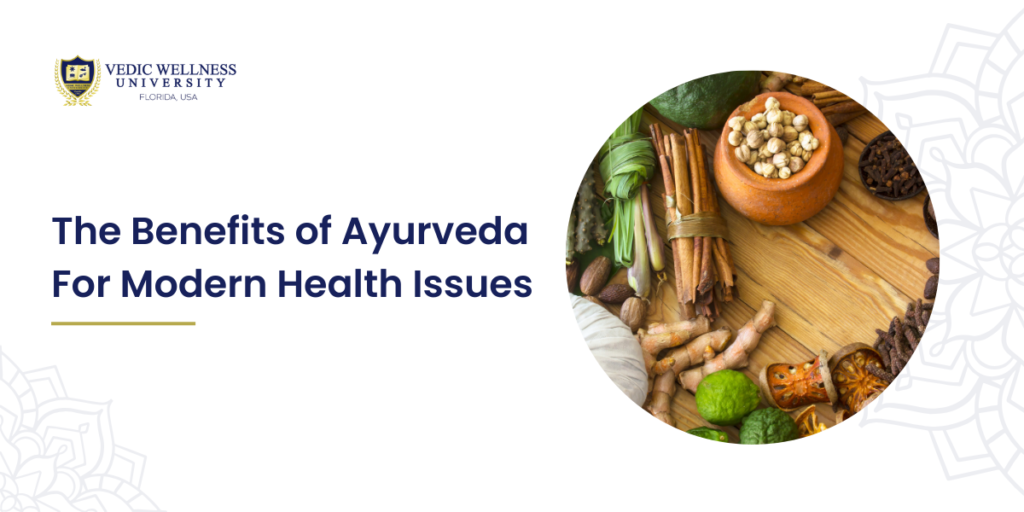Ayurvedic Lifestyle: Balancing Mind, Body, and Spirit

Introduction “धर्मार्थकाममोक्षाणामारोग्यं मूलमुत्तमम्।आरोद्योगमाहारसमुत्तिष्ठत्यायुषः परम्॥”(Dharmartha-Kama-Mokshanam Arogyam Moolamuttamam,Aarogyam Aaharam Saamyak Samutthishthati Ayushah Param)“Health is the greatest foundation for the attainment of Dharma (duty), Artha (wealth), Kama (desire), and Moksha (liberation). Proper nutrition promotes longevity and well-being.” This verse from the Sushruta Samhita underscores the essence of Ayurveda and its comprehensive impact on holistic well-being. Ayurvedic, an ancient system of medicine, emphasizes the balance of mind, body, and spirit to achieve optimal health and harmony. It provides a framework for understanding the natural constitution of an individual and the means to maintain balance through diet, lifestyle, and natural therapies. Basic Principles of Ayurveda Ayurveda is based on several fundamental principles that guide its holistic approach to health and well-being. Here are some of the core principles: 1. Doshas (Bio-Energies) Ayurveda identifies three primary doshas—Vata, Pitta, and Kapha. These doshas are biological energies found throughout the human body and mind, governing all physical and mental processes. 2. Prakriti (Constitution) Each individual has a unique combination of doshas, known as their Prakriti. This constitution determines physical characteristics, mental tendencies, and emotional behaviors. Understanding one’s Prakriti helps tailor personalized health and wellness plans. 3. Agni (Digestive Fire) Agni, or digestive fire, is central to health in Ayurveda. It is responsible for digestion, absorption, and assimilation of nutrients. Balanced Agni leads to good health, while impaired Agni results in illness. 4. Dhatus (Tissues) The body is made up of seven dhatus or tissues—Rasa (plasma), Rakta (blood), Mamsa (muscle), Meda (fat), Asthi (bone), Majja (marrow), and Shukra (reproductive tissue). The health of these dhatus is crucial for overall well-being. 5. Malas (Waste Products) Proper elimination of malas (waste products) is essential for health. These include urine, feces, and sweat. Regular cleansing of the body through detoxification practices is emphasized. The Ayurvedic Lifestyle An Ayurvedic lifestyle encompasses various practices aimed at maintaining balance and promoting holistic health. These include diet, daily routines, seasonal practices, and spiritual disciplines. 1. Diet (Ahara) “हितं सुखं दानं सान्निध्यं, प्रीणनं सन्तोषवर्धनम्।आयुष्यं बलकृत्प्रज्ञं सर्व रोग निवारणम्॥”(Hitam Sukham Daanam Saannidhyam, Preenanam Santoshavardhanam,Aayushyam Balakritprajnam Sarva Roga Nivaranam)“Wholesome food provides happiness, contentment, and good health. It promotes longevity, strength, and wisdom, and prevents all diseases.” Ayurveda emphasizes the importance of a balanced diet tailored to an individual’s constitution (Prakriti) and current state of health (Vikriti). Foods should be fresh, seasonal, and appropriate for one’s dosha. Meals should be consumed mindfully, and incompatible food combinations should be avoided. 2. Daily Routine (Dinacharya) “उषः कालं प्रबुद्ध्यायं चेष्टते हितमेव च।दोषाणां समता यान्ति व्याधयः पलायनम्॥”(Ushah Kalam Prabuddhyayam Cheshtate Hitameva Cha,Doshanam Samata Yanti Vyadhayah Palayanam)“Waking up early and following a healthy routine brings balance to the doshas and prevents diseases.” Dinacharya includes practices such as waking up early, oral hygiene, self-massage (Abhyanga), yoga, and meditation. It sets the tone for the day, ensuring physical and mental preparedness for daily activities. 3. Seasonal Practices (Ritucharya) “ऋतुषु स्वभावेण जायते च, स्थिराः सर्वे विनाशनम्।ऋतुसंधि समये युज्येत नित्यमुपचारेण योगवित्॥”(Ritushu Swabhavena Jayate Cha, Sthirah Sarve Vinashanam,Ritusandhi Samaye Yujyeta Nityam Upacharene Yogavit)“Adapting to seasonal changes by altering diet and lifestyle maintains health and prevents diseases.” Ritucharya involves adapting one’s diet and lifestyle to the changing seasons to maintain balance and prevent seasonal ailments. Each season has specific guidelines for diet, exercise, and detoxification practices. 4. Spiritual Practices (Adhyatma) “अयं निजः परो वेत्ति गणना लघुचेतसाम्।उदारचरितानां तु वसुधैव कुटुम्बकम्॥”(Ayam Nijah Paro Vetti Ganana Laghuchetasam,Udaracharitanam Tu Vasudhaiva Kutumbakam)“This is mine, that is yours, is the calculation of the narrow-minded. For the magnanimous, the whole world is a family.” Spiritual practices in Ayurveda include meditation, prayer, chanting, and self-reflection. These practices enhance mental clarity, emotional stability, and spiritual growth, contributing to overall well-being. Mind, Body, and Spirit in Ayurveda Ayurveda links the mind, body, and spirit, emphasizing their interconnectedness and the need for balance among them to achieve holistic health. 1. Mind (Manas) “योगः चित्तवृत्ति निरोधः”(Yogah Chitta Vritti Nirodhah)“Yoga is the cessation of the fluctuations of the mind.” Mental health is a crucial aspect of Ayurvedic wellness. Practices such as meditation, mindfulness, and positive thinking are recommended to maintain mental balance. Ayurveda also uses herbs like Brahmi and Ashwagandha to support mental health and cognitive function. 2. Body (Sharira) “सर्वे भवन्तु सुखिनः, सर्वे सन्तु निरामयाः।सर्वे भद्राणि पश्यन्तु मा कश्चिद्दुःखभाग्भवेत्॥”(Sarve Bhavantu Sukhinah, Sarve Santu Niramayah,Sarve Bhadrani Pashyantu Ma Kashchidduhkhabhagbhavet)“May all beings be happy, may all be free from disease, may all experience auspiciousness, and may no one suffer.” Physical health in Ayurveda is maintained through balanced nutrition, regular exercise, proper sleep, and detoxification practices. Yoga and Ayurvedic massages (Abhyanga) are integral to maintaining physical health and flexibility. 3. Spirit (Atman) “आत्मनं रथिनं विद्धि शरीरं रथमेव तु।बुद्धिं तु सारथिं विद्धि मनः प्रग्रहमेव च॥”(Atmanam Rathinam Viddhi Shariram Rathameva Tu,Buddhim Tu Sarathim Viddhi Manah Pragrahameva Cha)“Know the self as the rider, the body as the chariot, the intellect as the charioteer, and the mind as the reins.” Spiritual health involves connecting with one’s higher self and understanding the purpose of life. Practices like meditation, self-reflection, and devotion (Bhakti) help in nurturing the spirit and achieving inner peace. Vedic Wellness University’s Dedication to Ayurveda Vedic Wellness University is dedicated to promoting Ayurveda and traditional Indian practices through comprehensive courses and programs. Our curriculum integrates ancient wisdom with modern practices to offer a holistic education in Ayurveda. Courses Offered: How to Enroll: Prospective students can visit the Vedic Wellness University website to learn more about the courses and enrollment process. Scholarships and financial aid options are available for eligible students. Conclusion “वसुधैव कुटुम्बकम्”(Vasudhaiva Kutumbakam)“The world is one family.” Embracing an Ayurvedic lifestyle can lead to a balanced and harmonious life, promoting the well-being of the mind, body, and spirit. Vedic Wellness University is committed to spreading the wisdom of Ayurveda and other traditional Indian practices to foster a global community of health and wellness. By integrating ancient principles with modern education, we aim to empower individuals to lead healthier and more fulfilling lives.
The Benefits of Ayurveda for Modern Health Issues

Ayurveda, an ancient system of medicine that originated in India over 5,000 years ago, has gained global recognition for its holistic approach to health and wellness. This traditional practice, rooted in the principles of balance and harmony, offers effective solutions to a myriad of modern health issues. As an international institution dedicated to promoting Vedic studies, Vedic Wellness University emphasizes the relevance of Ayurveda in contemporary healthcare. Our extensive Ayurveda and Yoga programs aim to bridge the gap between ancient wisdom and modern medical practices. Understanding Ayurveda Ayurveda, “the science of life” in Sanskrit, focuses on maintaining health through balance in the body, mind, and spirit. It categorizes individuals into three primary doshas: Vata, Pitta, and Kapha, each representing different elements and bodily functions. The imbalance of these doshas is believed to cause various health issues. Ayurvedic treatments, therefore, aim to restore this balance through diet, lifestyle changes, herbal remedies, and yoga. Addressing Modern Health Issues 1. Stress and Anxiety In today’s fast-paced world, stress and anxiety have become prevalent. Ayurveda offers a comprehensive approach to managing these conditions through practices such as meditation, breathing exercises, and the use of adaptogenic herbs like Ashwagandha and Brahmi. According to a study published in the Journal of Alternative and Complementary Medicine, Ayurvedic treatments significantly reduce stress and improve mental health. “Sama Dosha Sama Agnischa Sama Dhatu Mala Kriya Prasannatmendriya Manaha Swastha Iti Abhidheeyate”(A healthy person is one who is established in Self, who has balanced doshas, balanced agni, properly formed dhatus, proper elimination of malas, well-functioning bodily processes, and whose mind, soul, and senses are full of bliss.)– Sushruta Samhita 2. Chronic Diseases Ayurveda is effective in managing chronic diseases such as diabetes, hypertension, and arthritis. By focusing on the root cause rather than just the symptoms, Ayurvedic treatments offer long-term relief. For instance, dietary changes and herbal formulations can help manage blood sugar levels and improve insulin sensitivity in diabetic patients. 3. Digestive Disorders Modern diets and lifestyles often lead to digestive problems like acid reflux, irritable bowel syndrome (IBS), and constipation. Ayurveda emphasizes the importance of Agni (digestive fire) in maintaining health. Practices such as mindful eating, incorporating digestive spices like ginger and cumin, and regular detoxification can significantly improve digestive health. “Aharavidhi Visheshayatana Adhyaya”(Diet and lifestyle recommendations to maintain balance and harmony.)– Charaka Samhita Ayurveda and Yoga: A Powerful Combination Integrating Ayurveda and Yoga, often called “Ayurveda Yoga,” is a powerful approach to achieving holistic health. Yoga practices enhance the benefits of Ayurvedic treatments by promoting physical, mental, and spiritual well-being. This combination addresses the body and mind simultaneously, effectively treating various health conditions. 4. Weight Management Obesity is a major health issue globally. Ayurveda Yoga provides a sustainable approach to weight management by focusing on a balanced diet, regular physical activity, and detoxification practices. Ayurvedic herbs such as Triphala and Guggul aid in fat metabolism and improve overall health. 5. Skin and Hair Health Ayurvedic remedies are renowned for their effectiveness in treating skin and hair problems. The use of natural ingredients like turmeric, neem, and aloe vera helps in managing conditions like acne, eczema, and hair fall. Ayurvedic massages and oil treatments also promote healthy skin and hair. Scientific Backing The efficacy of Ayurveda is increasingly being supported by scientific research. Studies have shown that Ayurvedic treatments can lead to significant improvements in various health conditions. For instance, a research article in the Journal of Ayurveda and Integrative Medicine highlights the benefits of Ayurvedic interventions in managing rheumatoid arthritis. Global Recognition The global acceptance of Ayurveda is growing, with countries like the USA, Canada, and Australia incorporating Ayurvedic practices into their healthcare systems. International students and practitioners are turning to institutions like Vedic Wellness University to gain a deeper understanding of Ayurveda and its applications. “Sarve Bhavantu Sukhinah, Sarve Santu Niramayah”(May all be happy, may all be free from diseases.)– Brihadaranyaka Upanishad Conclusion Ayurveda offers a holistic approach to health that addresses the root causes of modern health issues. By integrating Ayurvedic principles with contemporary medical practices, we can achieve optimal health and well-being. As we continue to explore and embrace this ancient wisdom, it is essential to educate and promote its benefits on a global scale. Vedic Wellness University is committed to this mission, providing comprehensive education and research opportunities in Ayurveda and related fields. For those seeking a natural and holistic way to manage their health, Ayurveda provides a time-tested and scientifically supported approach that can significantly improve quality of life. Join us at Vedic Wellness University to discover the profound benefits of Ayurveda and Yoga for modern health challenges.

